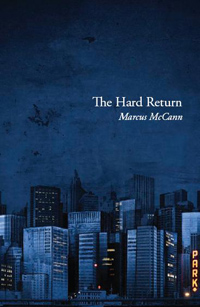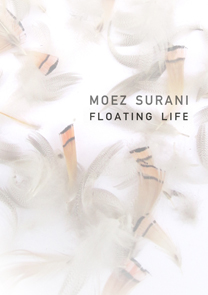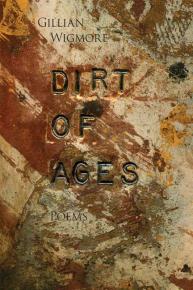Reviews
Poetry Reviews by Vanessa Herman
Marcus McCann, The Hard Return (Toronto: Insomniac, 2012). Paperbound, 78 pp., $17.
Moez Surani, Floating Life (Hamilton: Wolsak & Wynn, 2012). Paperbound, 96 pp., $17.
Gillian Wigmore, Dirt of Ages (Gibsons: Nightwood, 2012). 79 pp., $19.
Marcus McCann’s The Hard Return is a musical, sensual delight, a plurality
of voices both human and instrumental. The book opens, and
almost closes, with a prayer spoken by two people with slightly different
lines at the same time. A saxophone plays through several poems
while three found poems are a chorus of sixty-six raucous poets debating
the finer points of the morning, the feeling of soaking their brains
in “brine,” and how an orgasm is a metaphor for belonging. These
poems are seamlessly written and unless you knew all the original
poems by heart, you wouldn’t know where one poet’s line ended and
the next began. Each poem has a playfulness with its subject. Two
other found poems, “Password Security Monologue,” and “Password
Security Drinking Game,” poke fun at password security prompts
commonly found on websites. Another form McCann masters is the
glosa. “Earthenware Mug,” skillfully uses four lines from the middle
of Tim Lilburn’s poem, “Kill-Site,” an impressive feat for any poet.
Although the four lines don’t set the poem up (like a traditional glosa)
there is internal and slant rhyme, and deft movement through the
stanzas that give us transitions like, “Winds that blew fall blow / winter
now; heavy twist and giving up of snow // like a knotted bundle of
patch cords,” and “Morning’s roll call makes you squeamish, / it
slunk-hulks in from west of the river out of a greenish // twilight like dark
jelly.” (The italicized lines are from Lilburn.) Each new poem I read
brought a surprise. Even poems with mundane titles, such as “Coworker’s
House Party,” waken the reader with lyric moments: “we
carpoolers, starry from smudging the highway / like a thumb across
fluorescent cake crumbs, succumbed / for a bit.” The poem “Dawn
Lightning, Reflected Glass in a Condo,” offers the following:
both human and instrumental. The book opens, and
almost closes, with a prayer spoken by two people with slightly different
lines at the same time. A saxophone plays through several poems
while three found poems are a chorus of sixty-six raucous poets debating
the finer points of the morning, the feeling of soaking their brains
in “brine,” and how an orgasm is a metaphor for belonging. These
poems are seamlessly written and unless you knew all the original
poems by heart, you wouldn’t know where one poet’s line ended and
the next began. Each poem has a playfulness with its subject. Two
other found poems, “Password Security Monologue,” and “Password
Security Drinking Game,” poke fun at password security prompts
commonly found on websites. Another form McCann masters is the
glosa. “Earthenware Mug,” skillfully uses four lines from the middle
of Tim Lilburn’s poem, “Kill-Site,” an impressive feat for any poet.
Although the four lines don’t set the poem up (like a traditional glosa)
there is internal and slant rhyme, and deft movement through the
stanzas that give us transitions like, “Winds that blew fall blow / winter
now; heavy twist and giving up of snow // like a knotted bundle of
patch cords,” and “Morning’s roll call makes you squeamish, / it
slunk-hulks in from west of the river out of a greenish // twilight like dark
jelly.” (The italicized lines are from Lilburn.) Each new poem I read
brought a surprise. Even poems with mundane titles, such as “Coworker’s
House Party,” waken the reader with lyric moments: “we
carpoolers, starry from smudging the highway / like a thumb across
fluorescent cake crumbs, succumbed / for a bit.” The poem “Dawn
Lightning, Reflected Glass in a Condo,” offers the following:
with enough light,
everything comes unsewn.
The break is the break inside
nervous breakdown. Then,
dark pulls the plug, settles in
like a former classmate settles into
stalking you on Facebook…
…The hour
hums like a brother interrupting
bullying. You expect
and are surprised by the morning.
The tower isn’t ready to dry it eyes,
not yet. But don’t worry. It will.
In that moment, another kind of day rouses the city. We’ve all seen this sunrise before, but through McCann’s eyes we really see it for the first time.
The epigraph for Moez Surani’s Floating Life comes from Asai Ryoi’s
Tales of the  Floating World, preparing the reader for a disembodied journey
through a certain time of the poet’s life. Many poems, observed
from this high-up, floating perspective, speak with a despondent
frankness. The opening poem sets the high focal point: “When I am
reading / I feel life is outside. // When I am outside / I feel life is in
books. // I can never / find life.” This floating from above lifts, turns,
and dives as a feather might. The distant perspective, at times, is too
far from action or emotion to make a connection, while other lines
zoom in very close very quickly before retracting back to the great distance
above. This back and forth can leave a reader disoriented. I felt as
though I wasn’t given permission to understand whether a marriage
had really ended while the speaker enjoyed affairs, or if they happened
after, or if the “you” addressed became someone new or was the
same from beginning to end.
Floating World, preparing the reader for a disembodied journey
through a certain time of the poet’s life. Many poems, observed
from this high-up, floating perspective, speak with a despondent
frankness. The opening poem sets the high focal point: “When I am
reading / I feel life is outside. // When I am outside / I feel life is in
books. // I can never / find life.” This floating from above lifts, turns,
and dives as a feather might. The distant perspective, at times, is too
far from action or emotion to make a connection, while other lines
zoom in very close very quickly before retracting back to the great distance
above. This back and forth can leave a reader disoriented. I felt as
though I wasn’t given permission to understand whether a marriage
had really ended while the speaker enjoyed affairs, or if they happened
after, or if the “you” addressed became someone new or was the
same from beginning to end.
The withholding of certain details can obscure even concrete images. For example the significance of crystal is lost in the penultimate moment of a passage (in part II) describing a visit to Rome, Botticelli’s women, the pictures, and “all of the money spent.” “These retreating crystals / that imply false arcs and fade and fade / and permit no invasion.” However, the lines “She sleeps with her mouth open / and each breast verifies his hand” (“The Reunion”) are an intimate endearment. Just before the book’s end, a soft clause in “Spring” shoots the floating feather closer to the ground: “Only the magnolias have squandered their colour. / Their shells convalesce over the neighbourhood lawns. // Just yesterday / you brought me some, // but pulling their corpses from / your book where they lay clamped, // you thought again and discarded them, / stepping through my door with the story, the gesture.” This is the strength of Surani’s second book of poetry, subtle language that welcomes quietness.
Gillian Wigmore’s title, Dirt of Ages, echoes the hymn, “Rock of Ages,
cleft for me,  let me find myself in Thee,” and while it doesn’t contain
any overt Christianity, Wigmore’s second book still sings of joy and
strife. The opening poem, “The Back Then, the Here and Now,” turns
syntax and imagery, opening the door into this “other” northern life
where “plants photosynthesize with all their might / growing in the
false promise of summer in fall / then the nights frost up and undo
their efforts.” While the description and humbleness of the second
poem calls a moment of its own: “waiting for the strike, for feathers to
fall. hunting // or watching—wanting only to be fed, birds staring /
groundward, me staring skyward: weeping / or bleeding out, wary,
it’s all been said” (“Spring”). As a northerner, I am always elated to
find poetry by my own kind. After years of workshops, I agree wholeheartedly
with a poet who once observed that there are urban poets
and rural poets and it’s like they speak a different language the other
can never understand. I can’t help but feel someone from the city
might not understand why “sun, and we are the houseplants begging
for it, facing south all day” (“Rain in Due Season”), is such a well-captured
moment of living in the dark north, or how the poem “Sailing”
stands as a metaphor for the lives of northern women in a sea of men.
The book is halved into two parts, “Water Girls,” and “Construction.”
The first focuses on the poet’s life: the daily struggle through long
winters, mud, the pollution of resource extraction, contrasted with
gratitude for family, love, children, and the beautiful scenes that come
out of nowhere, like sun clearing fog. The second is a glimpse beyond
the home: of work, industry, forests, the roughness, the “culmination
of weather and beetle hatch / the cash in the boom / the fall” (“Pine: A Love Story”). Wigmore digs out the right words for each moment of
hardship and exultation, inviting us all to “wash off all this dirt in / the
dirt of ages… we run til we’re half standing and jump / hoping like
hell…til you’re lying face up / in a whirlpool, laughing at the sky”
(“Water Girls”).
let me find myself in Thee,” and while it doesn’t contain
any overt Christianity, Wigmore’s second book still sings of joy and
strife. The opening poem, “The Back Then, the Here and Now,” turns
syntax and imagery, opening the door into this “other” northern life
where “plants photosynthesize with all their might / growing in the
false promise of summer in fall / then the nights frost up and undo
their efforts.” While the description and humbleness of the second
poem calls a moment of its own: “waiting for the strike, for feathers to
fall. hunting // or watching—wanting only to be fed, birds staring /
groundward, me staring skyward: weeping / or bleeding out, wary,
it’s all been said” (“Spring”). As a northerner, I am always elated to
find poetry by my own kind. After years of workshops, I agree wholeheartedly
with a poet who once observed that there are urban poets
and rural poets and it’s like they speak a different language the other
can never understand. I can’t help but feel someone from the city
might not understand why “sun, and we are the houseplants begging
for it, facing south all day” (“Rain in Due Season”), is such a well-captured
moment of living in the dark north, or how the poem “Sailing”
stands as a metaphor for the lives of northern women in a sea of men.
The book is halved into two parts, “Water Girls,” and “Construction.”
The first focuses on the poet’s life: the daily struggle through long
winters, mud, the pollution of resource extraction, contrasted with
gratitude for family, love, children, and the beautiful scenes that come
out of nowhere, like sun clearing fog. The second is a glimpse beyond
the home: of work, industry, forests, the roughness, the “culmination
of weather and beetle hatch / the cash in the boom / the fall” (“Pine: A Love Story”). Wigmore digs out the right words for each moment of
hardship and exultation, inviting us all to “wash off all this dirt in / the
dirt of ages… we run til we’re half standing and jump / hoping like
hell…til you’re lying face up / in a whirlpool, laughing at the sky”
(“Water Girls”).
—Vanessa Herman









